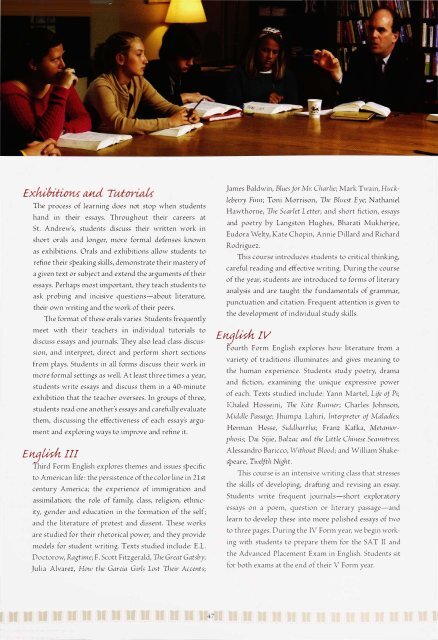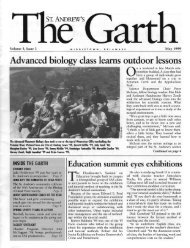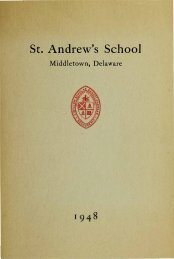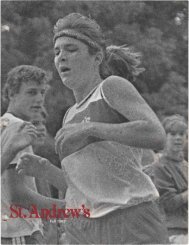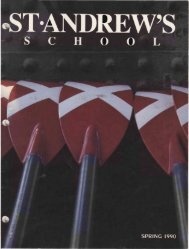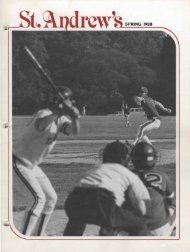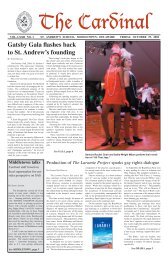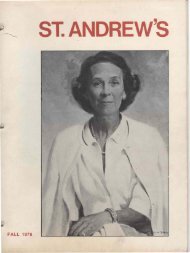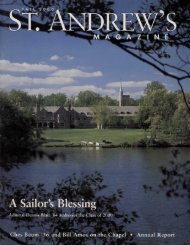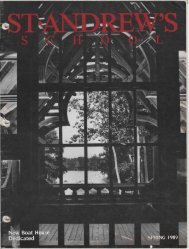Untitled - Saint Andrew's School Archive - St. Andrew's School
Untitled - Saint Andrew's School Archive - St. Andrew's School
Untitled - Saint Andrew's School Archive - St. Andrew's School
You also want an ePaper? Increase the reach of your titles
YUMPU automatically turns print PDFs into web optimized ePapers that Google loves.
The process of learning does not stop when studentshand in their essays. Throughout their careers at<strong>St</strong>. <strong>Andrew's</strong>, students discuss their written work inshort orals and longer, more formal defenses knownas exhibitions. Orals and exhibitions allow students torefine their speaking skills, demonstrate their mastery ofa given text or subject and extend the arguments of theiressays. Perhaps most important, they teach students toask probing and incisive questions-about literature,their own writing and the work of their peers.The format of these orals varies. <strong>St</strong>udents frequentlymeet with their teachers in individual tutorials todiscuss essays and journals. They also lead class discussion,and interpret, direct and perform short sectionsfrom plays. <strong>St</strong>udents in all forms discuss their work inmore formal settings as well. At least three times a year,students write essays and discuss them in a 40-minuteexhibition that the teacher oversees. In groups of three,students read one another's essays and carefully evaluatethem, discussing the effectiveness of each essay's argumentand exploring ways to improve and refine it.ErtjUMt IllTI1ird Form English explores themes and issues specificto American life: the persistence of the color line in 21stcentury America; the experience of immigration andassimilation; the role of family, class, religion, ethnicity,gender and education in the formation of the self;and the literature of protest and dissent. These worksare studied for their rhetorical power, and they providemodels for student writing. Texts studied include: E.L.Doctorow, Ragtime; F. Scott Fitzgerald, The Great Gatsby;Julia Alvarez, How the Garcia Gi1·ls Lost Their Accents;James Baldwin, Blues for Mr. Charlie; Mark Twain, HucklebenyFinn; Toni Morrison, The Bl,test Eye; NathanielHawthorne, The Scarlet Letter; and short fiction, essaysand poetry by Langston Hughes, Bharati Mukherjee,Eudora Welty, Kate Chopin, Annie Dillard and RichardRodriguez.This course introduces students to critical thinking,careful reading and effective writing. During the courseof the year, students are introduced to forms of literaryanalysis and are taught the fundamentals of grammar,punctuation and citation. Frequent attention is given tothe development of individual study skills.Ertjtidt IVFourth Form English explores how literature from avariety of traditions illuminates and gives meaning tothe human experience. <strong>St</strong>udents study poetry, dramaand fiction, examining the unique expressive powerof each. Texts studied include: Yann Martel, Life of Pi;Khaled Hosseini, The Kite Rwmer; Charles Johnson,Middle Passage; Jhumpa Lahiri, Interpreter of Maladi.es;Herman Hesse, Siddhartha; Franz Kafka, Jv[etamorphosis;Dai Sijie, Balzac and the Little Chi11ese Seamstress;Alessandro Baricco, Without Blood; and William Shakespeare,Twelfth Nigl1t.This course is an intensive w-riting class that stressesthe skills of developing, drafting and revising an essay.<strong>St</strong>udents write frequent journals-short exploratoryessays on a poem, question or literary passage-andlearn to develop these into more polished essays of twoto three pages. During the IV Form year, we begin workingwith students to prepare them for the SAT II andthe Advanced Placement Exam in English. <strong>St</strong>udents sitfor both exams at the end of their V Form year.I I 47


